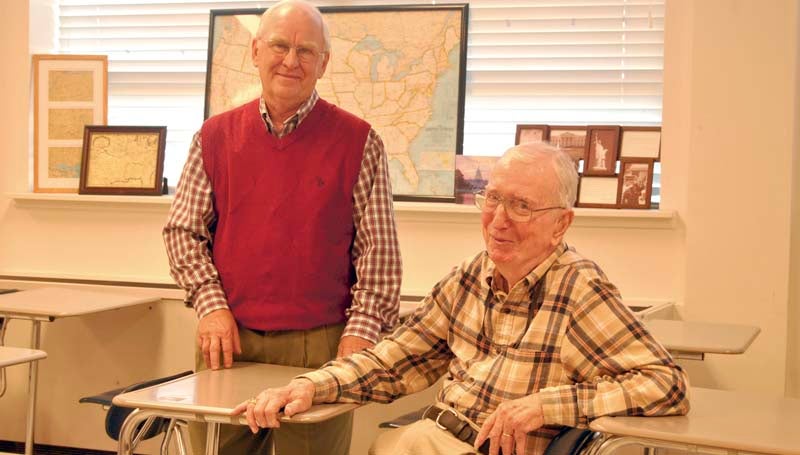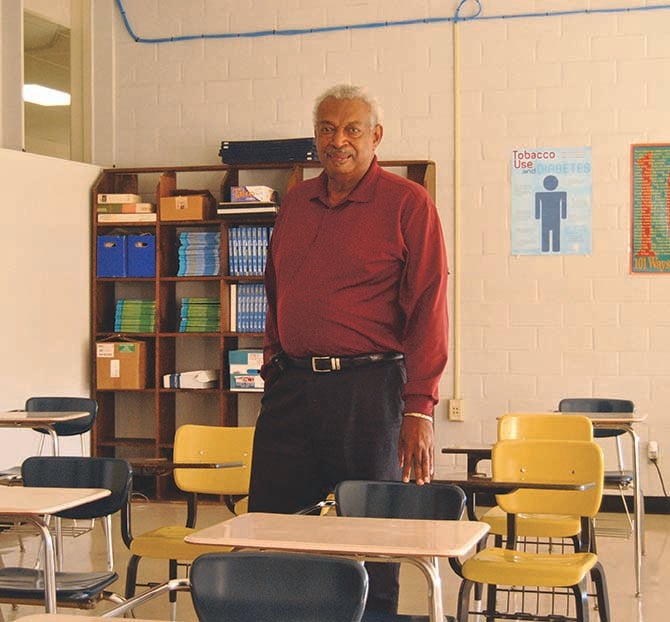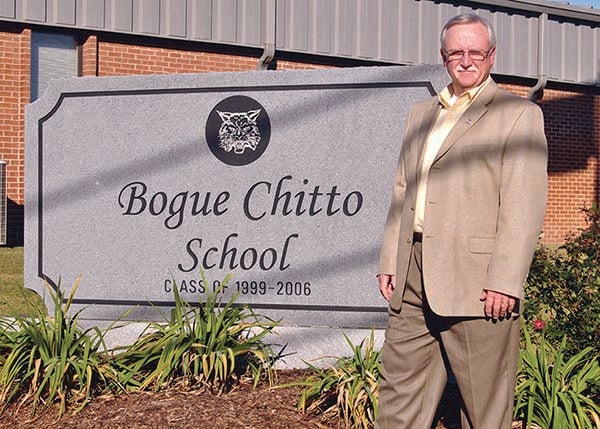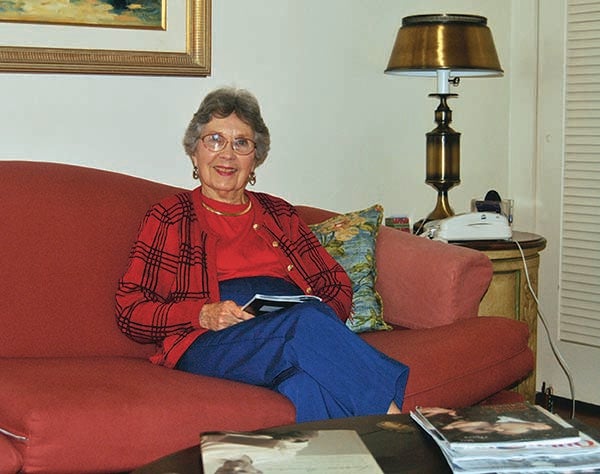50 Years Ago Today: Remembering the assassination of JFK
Published 1:00 pm Friday, November 22, 2013

Chester Foster (from left) and his former history teacher, Don Hemphill, discuss the 50th anniversary of JFK’s assassination in the room at Brookhaven High School where they first learned the news.
Transfixed in time, President John F. Kennedy’s death at 12:30 p.m. on Nov. 22, 1963, is recalled by many through a mental reel of black and white images: the motorcade winding its way through Dealey Plaza in downtown Dallas, his smiles before the sudden slump, the first lady’s blood-stained suit, Johnson’s raised right hand in Air Force One.
And for most Americans over 55, the pictures are still vivid in spite of a half-century’s worth of other world-shattering events to dull them.
In this issue of The Daily Leader, local residents share their remembrances of that fateful day in American history. They were the children who wondered why flags were at half-mast and the teenagers who were surprised by Walter Cronkite’s tears.
They were the adults who attempted to comprehend the sudden end of an iconic president and his too-short season of Camelot. But no matter their age or how they first heard the news of the assassination, those who lived it have held on to that memory now for 50 years. Here, in their own words, are a few of their stories.
Area Residents Remember the Day
“It was just after lunch. I was teaching a history class at Brookhaven High School when the principal, Mr. Roach, shared the news over the loudspeaker. This was a time when a lot of people in the South weren’t too fond of Kennedy. Some things were said, and one of my students got really upset. He reminded the class that no matter how you felt about him, he was the President, and it was a terrible loss.”
—Don Hemphill, former Brookhaven Elementary School principal
“I was a student in Mr. Hemphill’s class that day. We were teenagers and weren’t taking the news as seriously as we should have until we saw the tears in his eyes and heard his voice shaking. He tried to explain what a tragedy it was, then he couldn’t teach anymore. There was a lot of silence. We sat there a long time. The only assassination we knew about was Abraham Lincoln’s; then all of sudden, it had happened in our generation.”

Carolyn Beard Humpheries stands near the well on her family’s property at Loyd Star. She remembers she was watching her mother hang laundry on a clothesline at that spot when they learned President Kennedy had been shot.
—Chester Foster, Foster’s Convenience Store
“I was very young, but I do remember that my mother was hanging clothes on the line outside when my aunt came and told us that she had heard it on the radio. They were crying like they had lost a family member. The older children came home from school, and they cried, too. We were all very sad.”
—Carolyn Beard Humphries, retired Brookhaven Public Schools and Daily Leader community columnist
“I was in second grade at Brookhaven Elementary. The main thing I remember is how upset everyone was on the school bus ride home. What was going to happen to us? Was the world coming to an end? Were the communists going to take over? There was real terror in my little heart.”
—Bea Teasley, Lincoln County Public Library reference clerk
“I remember it was raining that day, and I was thinking about the football game that night. I was a junior at Alexander High School, and we were in class when someone came in and told us. Everybody was real quiet. Nothing like that had happened in our lifetime. In the end, the decision was made to play the football game as scheduled. Our administrators felt it was important to move forward. It rained that night, too.”
—Pap Henderson, retired Brookhaven chief of police

Pap Henderson was a student at Alexander High School when he learned of President Kennedy’s death. He is shown here in a classroom in that building, which is now used as the Brookhaven’s junior high school.
“I had come home from the high school because I was only teaching part-time, and I heard it on the radio. I immediately called the school administration to let them know, because I wasn’t sure they had access to the news. I was horrified and sorry that it happened in a southern state, and I was terribly grieved that such a young, vibrant leader had been so violently removed. In the days following that event, I was proud of the way the presidency was handed over to a new leader, especially in contrast to countries that don’t have that continuity. We have a system in place to see that our government continues, even in the worst of circumstances.”
—Phyllis Spearman, retired Brookhaven Public Schools teacher
“We were on the playground at Bogue Chitto School, and our teacher called for us to come inside. The principal got on the intercom and told us the president been shot and killed. I was young, only in second grade, but I knew it was serious. We all just sat there. It’s a moment I’ve never forgotten.”
—Fletcher Grice, Ward 5 alderman
“I was living in Pennsylvania, and it was an exciting day for me because we were planning a rare night out at the Philadelphia 76ers basketball game. As my children napped, the news flashed. I could not believe that the president had been attacked in an environment where he obviously wasn’t apprehensive for his life. It appeared he had decided to be very visible and in contact with the citizens he served. (I’ve always admired those who live fearlessly.) At any rate, the children awoke from their naps, the country froze and the basketball game was canceled. Life went on, but that event changed perspective on everything.”
—Betsy Smith, Betsy Smith Properties Inc.

Fletcher Grice was only in second grade when Kennedy was shot, but he can remember being called in from the playground at Bogue Chitto School and listening as his teacher shared the news.
“I was in a carrel in the library at the University of Southern Mississippi preparing for a test when someone came in and made the announcement. Back then the only television in our dorm was in the lobby, so we all crowded around it. I just remember it was a very unsettling time. There was a lot of turmoil in our country then anyway, and the assassination just added to it.”
—Roy Daughdrill, retired Copiah-Lincoln Community College math division chairman and First Baptist Church organist
“My family was living on a military base in California, and I was in junior high. We were on the quad during our lunch break when we heard the news. People were breaking down crying, and we were all worried that our dads would be sent away to deal with whatever was happening. Russia was our enemy then, so we were wondering if they had something to do with it. I can still see my dad’s reaction – he was very quiet and kept a stiff upper lip.”
—Ellie Jordan, Lincoln County Public Library circulation clerk
“I was in second grade in Monroe, La. We had a television in our classroom for Spanish lessons, and the teacher turned it on. I remember watching the footage over and over and seeing Walter Cronkite cry. A lady who worked in the cafeteria was screaming. I think it was so memorable because it was the first time the media was present when something like this happened.”
—Bruce Dow, retired carpenter

Phyllis Spearman sits in the room of her home on Church Street where she heard the news of the President’s assassination on her radio.
“I was in a dorm at Alcorn State University. I remember we students felt that we had lost a president that was trying to make improvements on both sides. He was trying to bring about a change that was not accepted at that time. It was a real setback for progress.”
—Andrew Spiller, retired Lincoln County Public Schools teacher
“I was in Gainesville, Ga., working for a company called Southeastern Freezer, and I had gone to the cooling section to look for a box of frozen chicken. Someone came in and gave me the news. It made me realize there’s a right way and a wrong way to resolve differences in political ideologies. That was definitely the wrong way.”
—Bobby Britt, State Farm Insurance agent
“I was at home with my children when the news interrupted the regular programming. I couldn’t believe it. I was shocked. But I’m shocked today, too, by the stuff that goes on, all the terrible things that happen.”
—Jeannette Smith, former Monticello Elementary School teacher
“I was in the ladies lounge in Lee Hall at Mississippi State, waiting for my accounting class to start at 1 p.m. Someone came in the lounge and told us the president had been shot. My class wasn’t canceled, but it was hard to concentrate. I remember how very solemn Walter Cronkite was in his newscast. I was home from church that Sunday morning with a sick child when Lee Harvey Oswald was shot. I witnessed it on TV.”
—Karen Sullivan, alderman at large

Bea Teasley stands in front of buses waiting for school to let out at Brookhaven Elementary. She was a student at that school in 1963 and remembers the anxious ride home on the bus after Kennedy was slain.
“I was in ninth grade at Alexander, and a student came running down the hall, then the teacher looked at us and told us President Kennedy had been shot. Everybody started crying. It seemed like the whole week, we just watched it over and over on TV. There were lots of questions about whether it was just one shooter or a conspiracy.”
—Kirby Humphries, retired, Walmart Distribution Center
“I was walking back from the gym at Brookhaven High School when I met a fellow student, and I remember him saying, “We’ve lost our president.” I later watched all the footage of his wife in the limo, the impact of the bullet. It’s a very vivid memory, much like 9/11, when we watched the second plane hit the tower.”
—Steve Moreton, Brookhaven director of public works
“I was at home in Chicago combing my daughter’s hair when the news came over the television. I was upset and crying like everybody else. I watched Oswald get killed, and I remember watching the President’s funeral, too. It was very sad because the Kennedy family contributed a lot to the United States.”
—Bernetta Character, retired United State Postal Service postmaster
“I was in school in Birmingham, Ala. I was about 10 years old, so all I really remember is school was turned out, and we went home. Looking back, I can see how the shock of it all had a great effect on America, and the events that followed certainly did, too.
—Michael Jinks, Brookhaven city clerk
“I was a third-grade teacher at Mullins Elementary, and I remember the principal, Mr. Dow, came down the hall and told us the president had been shot. Later we learned he was dead. There was chaos everywhere. There were riots. People were venting.”
—Flora Kelly, retired Brookhaven kindergarten principal
“I was in Los Angeles, Calif., in my apartment living room. I was only 20 and just learning to pick up on what was going on in the country, and there was a lot going on in the ’60s. When I saw the news on TV, it felt like I had been shot. To lose a president who was straightening things out with Cuba and Russia – it felt like a bomb had been dropped. When Kennedy came on board it seemed like congressmen and senators were coming together. I just wondered, where are we going now?”
—Terry Bates, Ward 2 alderman

